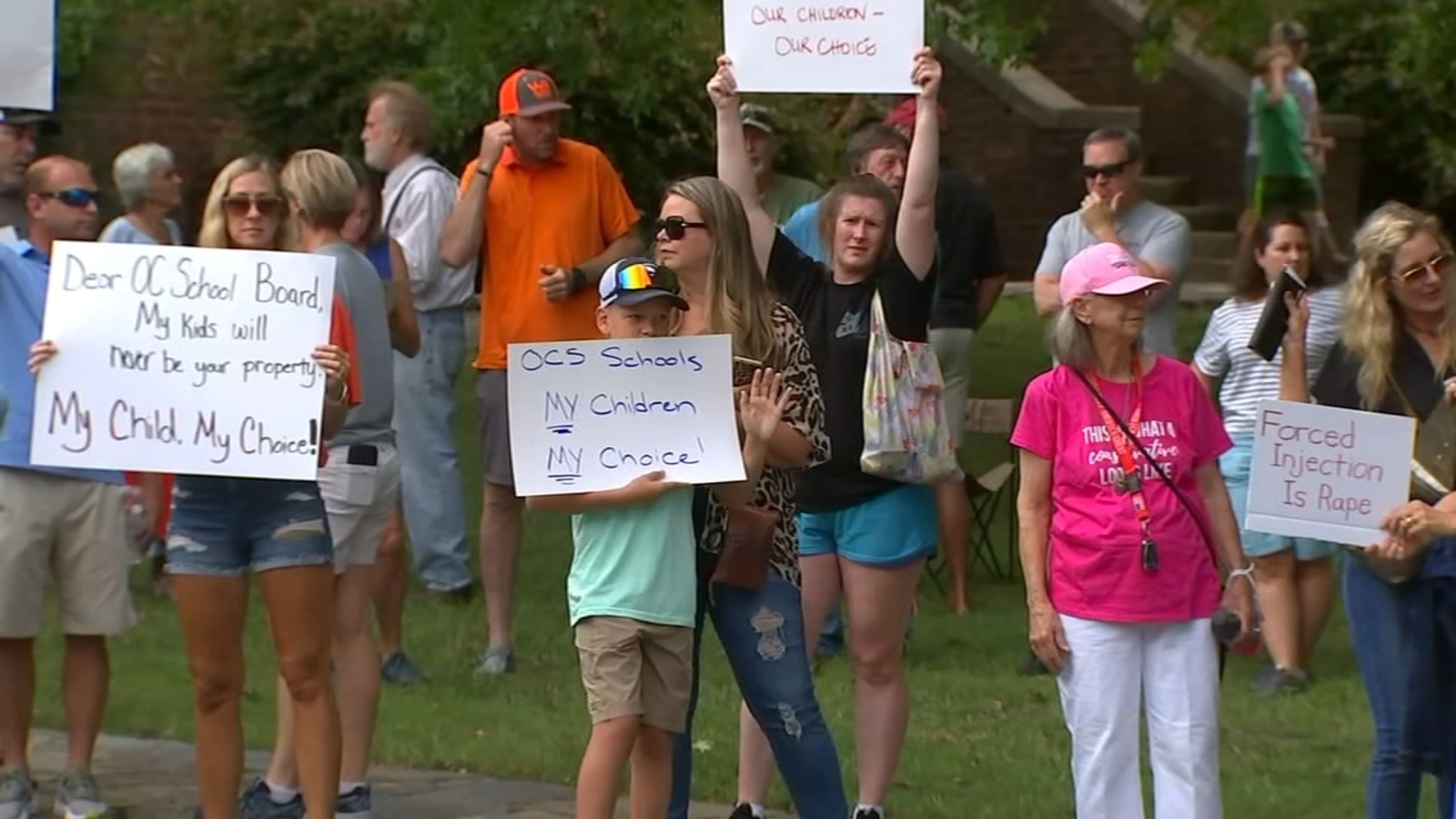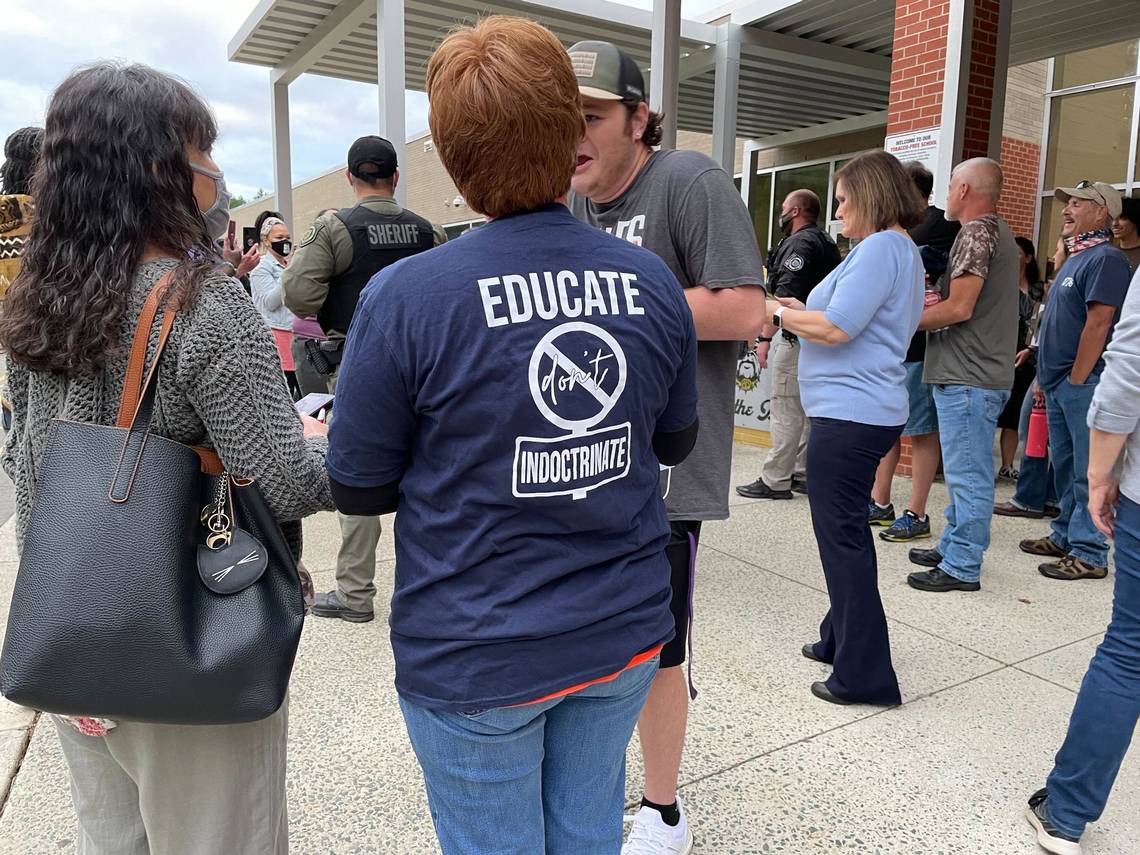Chair of the Orange County Commissioners Renée Price spoke with 97.9 The Hill’s Brighton McConnell on Wednesday, June 8th. This is a transcript of her discussion of new rules around protests at schools, the county’s manufactured housing plan, and more. Listen to the full interview here.
Brighton McConnell: We’re getting close to summertime really kicking in across our community, but on the local government side, there are a whole bunch of meetings before most of our elected officials take a bit of a summer break. And I know that that’s the case for the Orange County Commissioners, too, having a meeting last night and another meeting on the calendar for tomorrow, I figure that’s where we’ll start, Renee.
Renée Price: We’re trying to get everything tied away before we go on break. Of course, the budget is the biggest item that we will be dealing with and we’ll bring the amendments to the manager’s recommended budget tomorrow and take a look at that. And then we still have other items that we wanted to finalize, or at least get a little closer to finalizing. And we talked about some of that last night. One in particular was having large gatherings as we’re calling it in the direct ordinance, or picketing around our schools. We wanted to have that established before the next school session started so we addressed that last night and we’ll have the final vote on it on the 21st.
McConnell: That was definitely an agenda item that I think caught the eye of many folks. And for some context here, this stems from several demonstrations that happened earlier in the year and even last school year when there were Proud Boys and other community members out there who were against mask mandates in schools and were protesting that. But also I know from talking with Orange County Schools that these community members also disturbed some of the people who were in school at the time that was happening. And so it sounds like the county commissioners decided to explore the possibility of this ordinance in order to provide a better environment for those who are at school. I’m hoping you can provide some insight into this. It is a tricky balance of the First Amendment and everybody’s right to protest and free speech, but at the same time, you have kids who are actively in school.
Price: Exactly. We’re in no way trying to restrict anyone’s right to speak, which is why we’re only focusing on schools rather than looking at all public properties. But our concern really is a learning environment for our children. If you’re an adult, that’s one thing, you do as you see fit. But as for our young people, they’re very vulnerable. I’m not a parent and I’m not telling people how to raise their children, but you want to inform them about life and at the same time protect them from things that may be disturbing or cause trauma.
That was the issue that we were really dealing with. When we got a report from the school system, they had gotten some statements from some of our young people and they were very disturbed by some of the things that they had seen and heard. And so that’s why we wanted to get this in place. Now if the students themselves want to protest, maybe they don’t like what’s being served at lunch or something, we are not restricting that. What we want to do is allow the school properties to be used for just that. For education and for schools and for students. And we also included playgrounds that are attached to public facilities. Again, we want our children to be able to play in a place that’s safe and where they are shielded from any type of disturbance to an extent.
McConnell: And so a few more nitty-gritty details, it is a 1000-foot buffer and it was an ordinance that wasn’t necessarily passed at last night’s meeting, right Renee? It’s a situation where you’ve got to do a first reading of the ordinance and as you mentioned, it’s going to be voted on at a later meeting.
Price: Right. We have to have the second reading and that will be on June 21st.
McConnell: We’ll continue to keep an eye on that. We’ve been seeing tons of demonstrations here in Chapel Hill and Carrboro, and also in Chatham County and other schools around the Triangle. Students are walking out protesting school safety, gun violence, protesting restrictions on abortions. It’s becoming more and more common. I’m curious as to your thoughts on that too. Renee, how does it feel seeing the younger members of our community, and your constituents as the county commissioner, speaking up and making their voices heard?
Price: Well, I have to go along with them because we didn’t really do a walkout when I was in high school, but certainly when I was in college we had to walk out and protest some of the books that were being used for sociology at the time. They were quite offensive if you were an African American. I do believe that as long as they are peacefully protesting–if it’s a peaceful, organized protest–they should be allowed to do so and express their opinion.
McConnell: It sounds like the County Commissioners just established a pretty special fund to help out long-time homeowners, correct?
Price: Yes. Last year when we were doing amendments to the budget last year, I proposed an amendment of $250,000 to help with tax relief. And we realized that only 91 people were able to take advantage of it last year so we looked at some of the criteria and the parameters, and we’ve made some changes. Hopefully this year we will be able to provide relief to many more households. At the same time, we’re trying to help to preserve the neighborhood. We still need to look at the process of doing evaluations and assessing homes and looking at the forces of gentrification and how can we keep people in their homes and maintain some of our historic neighborhoods as life goes on. As Chapel Hill, Carrboro, and Hillsborough continue to develop, how can we keep people in their homes when they’re sitting on land that years ago might have seemed like the outskirts of town, but now it’s right in the middle of downtown, which has become prime real estate?
But at the same time, we’ve got families that have been in these neighborhoods for several generations with the help of some of our community organizations. I think we’ve come up with a good set of criteria. There’s one last thing that they need to do to figure out the formula for evaluating the applications to give out funding, but I think we’re in a good place.
McConnell: So from re-upping and going through the process with that long time homeowners fund again, to talking about the manufactured homes plan that the Orange County government is putting in place, lots of home discussions here. We’ve talked a little bit about the manufactured homes plan, but it was something that kept getting bumped back. Can you share once again with our listeners why it’s important in your mind for the county government to have a plan in place when it comes to manufactured homes and mobile homes?
Price: Well, our communities that live in manufactured homes are also in some cases in a very challenging position. Some of them are close to downtown or they’re in areas that are primed for development. And so depending on who the property owner is, those properties could be sold. And then where do they go? This is a way of trying to address that issue head-on, and the reason that we had it bumped back this year is we wanted the towns to sign on. They will probably be doing a good share of the work in this plan because the manufactured home parks are in our urban areas. We do have quite a few outside of the incorporated areas, but we want to make sure that they were on board and then we gave our blessing as well.
McConnell: Sure. So those are the goals of this plan. You mentioned the town’s involvement, how are the local governments going to go about trying to protect these communities and residents?
Price: There are several aspects to it from helping people to maintain their homes to programs such as urgent repair or CDBG funds making sure that the homes are safe and whatever infrastructure is there is intact. And then looking at ways of strengthening communities. For example, there’s an organization called ROC USA which works with manufactured home owners in forming co-ops to be able to purchase their land so that residents can stay there.
Number one, we want people to stay in their homes and make sure that they’ve got the resources to maintain their homes properly and money for the utilities. And then the other portion is looking at the fact that people form communities when they’re in these manufactured home parks. And just to say you have to live elsewhere breaks up a community, breaks up that that synergy that has developed, and we want to prevent that from happening
McConnell: Got a couple of moments left, Renee, anything else happening around the Orange County community or government that you want to make sure that folks are aware of? You mentioned the meeting that’s happening Thursday June 9th, but anything beyond that?
Price: That will be our budget work session, where we will look at the amendments that other commissioners have proposed and vote them up or down or modify them. And then we do have another work session coming up on Tuesday. Then the following Tuesday will be our last meeting for the fiscal year where we will actually vote on tomorrow’s budget. We’ll make all the corrections and make our intent for the budget. And then on the 21st, we’ll actually vote on the budget and take care of a few more items before we close. And then even though I had just said we’ll be done for the end of the year in terms of business, two days later, the commissioners will be holding our annual retreat, which was supposed to have happened in January, but because of COVID and then trying to rearrange dates and, and coordinate everyone’s schedules, we weren’t able to do it back in January. So we’re holding our retreat on June 23rd.
McConnell: Busy, busy time for our county government. Be sure to head to OrangeCountyNC.gov to learn more about the things that we’ve been talking about today, and even more. As always Commissioner Price, thank you so much for taking the time and we’ll look forward to talking with you again next week.
Price: Okay. Thank you. And have a good week.

Listen to ‘News on The Hill each week to hear the latest Conversations with the Mayors! The elected leaders of the Chapel Hill, Carrboro, Hillsborough and Orange County governments join 97.9 The Hill to discuss the latest stories from around town and our community. Listen to all episodes here!
Chapelboro.com does not charge subscription fees, and you can directly support our efforts in local journalism here. Want more of what you see on Chapelboro? Let us bring free local news and community information to you by signing up for our biweekly newsletter.










